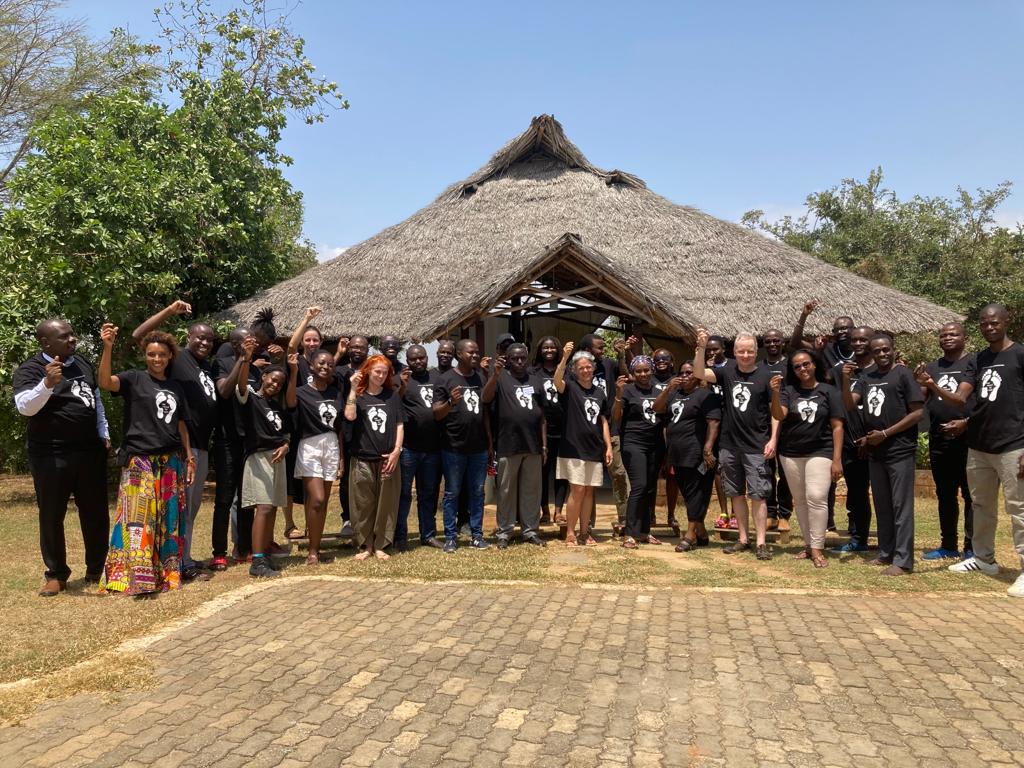
Director’s Blog
Population Matters Director Robin Maynard’s monthly reflections.

April 2022
Unintended pregnancies and climate censorship

This year’s edition of the UN Population Fund’s (UNFPA) annual State of the World Population (SWP) report focused on the persistent fact that nearly 50% of all pregnancies worldwide are unintended. Many of those unplanned babies will nevertheless be wanted and loved. But for hundreds of millions of women, particularly in poorer countries, there never was any choice in the first place. This is most shockingly apparent in the report’s statistics about adolescent mothers:
- Across the developing world, 1 in 3 women aged 20-24 gave birth when they were between 10 to 19 years old
- Half of those adolescent mothers were under 17
Put plainly, thousands of girls, themselves children, are giving birth.
Shocking in a different way is the determination of policymakers and commentators to deny population growth has any part to play in our ecological and climate crises, despite the scientific evidence. The IPCC’s recent climate change mitigation report, ‘AR6’ in shorthand, offers a prime example. The main report affirms the IPCC’s 2014 assessment: “Globally, GDP per capita and population growth remained the strongest drivers of CO2 emissions from fossil fuel combustion in the last decade.” Yet its Summary for Policymakers contains no reference to population growth.
As Professor Philip Cafaro of Colorado State University wryly notes, “[The Summary] is all most people read. Unlike the full report, this document is vetted by political appointees. They apparently decided to censor anything that might call into question the goodness of continued growth.” I particularly enjoyed Cafaro’s critique of a comment piece in The Guardian by Simon Lewis, who either hadn’t read past the Summary or chose to ignore the frequent citing of the population factor in the main report:
“It is sad that columnists and editors at The Guardian support such political censorship and wilful blindness. And it is ironic, given their supposed sensitivity toward the global poor. For the IPCC’s Sixth Assessment Report makes clear that the poor will bear the brunt of humanity’s failure to adequately mitigate climate change.”
March 2022
Talking population in Kenya

I’m just back from ‘The Population Conversation’ symposium held in Kenya. Of over 30 participants, I was the only non-African. The symposium’s title came about through ongoing conversations between the event’s instigator, Dr Monique Oliff (a public and women’s health consultant based in Kenya), and myself over the months we waited for Covid restrictions to ease.
Over the same period, our Empower to Plan (E2P) Coordinator, Catriona Spaven-Donn, has been in Guatemala and Colombia, strengthening PM’s links with grassroots partners. It was interesting to learn that the name of our Guatemalan partners, Na’leb’ak, translates from the Maya Q’eqchi language as ‘a collective dialogue to reach a consensus’.
Open dialogue and honest conversations are essential to build a consensus for focusing action on all the drivers of the climate, biodiversity and social justice ills undermining the wellbeing of people and planet – and for deploying the solutions. Yet many policymakers and NGOs, removed from the reality of lived experience, equivocate. It’s obtuse to identify agriculture as the main cause of wildlife habitat loss, but not acknowledge that the expansion of agricultural land is in large part driven by the need to feed the extra 82 million people added to our population each year. Perverse, to champion choice and access to family planning for the 270 million women worldwide currently lacking that basic human right, whilst denying the huge secondary contributions in curbing climate change and slowing biodiversity loss.
The ‘Population Conversation’ embraced both truths, with consensus amongst all the participants that the population factor should be integrated across all disciplines: soil and water resource management, food security, coral reef and fisheries protection, girls’ education and equality programmes, wildlife and conservation work, and not least for the health and wellbeing of Kenya’s people.
February 2022
En route to Kenya

I am writing this en route to Kenya for the key ‘Population Conversation’ symposium in Kilifi, co-hosted by PM, but organised by Kenyans – I will happily be in a minority of one non-African participant attending, out of some 30 attendees.
This event has been planned since 2019, when along with my colleague Florence Blondel, I attended the International Conference on Population & Development (ICPD25) in Nairobi and met up with Dr Monique Oliff of WellSense, a public health consultancy working across East and South Africa.
Covid has twice forced us to postpone, but given the list of attendees, the delay has been put to good use to contact, invite, and get acceptances from the widest range of participants. It is a sad and telling fact that had PM been seeking to organise a similar event in the UK, Europe or the US, we would have been unlikely to get comparable interest and from such key sectors: officials working within the Ministries of Health and Education, health professionals, activists delivering on women’s rights and reproductive health at the community level, academics, and NGOs working across the suite of sustainability issues from water resources, soil erosion, to climate change and biodiversity loss. And crucially, a group of young people – the generation facing the accelerating impacts of climate change and population growth.
Kenya’s human population has grown from just over 8 million people in 1960 to over 50 million today, and is projected to hit over 90 million by 2050. Population is very much part of the ‘conversation’ we will be having, but so too is the inequitable resource take, consumption, and historic pollution of those of us in the rich world and our responsibility to address that, whilst enabling people in Kenya and other low-middle income countries to exercise their rights – especially for girls and women to be able to choose the number of children they have, when or indeed not to have.
Our colleagues from Dandelion Africa and Komb Green, whom PM has supported through Empower To Plan, will also be attending. As well as the formal presentations and discussions, the Kenyan team have organised storytelling and drama sessions, with the young people creating a song around the themes and messages that emerge. The ingredients are set for a very productive, inspiring, and truly representative gathering. Expect more!
January 2022
Remembering Sir Crispin Tickell

PM and the planet lost a great advocate with the death of out patron Sir Crispin Tickell on 25th January. As our President, Jonathon Porritt, notes below, Sir Crispin is credited with tingeing the ‘Iron Lady’, previous UK Prime Minister Margaret Thatcher, greenish; setting out in stark terms the humanitarian and political crises that climate change, exacerbated by population growth, would cause. Our thoughts and condolences go to his widow, Penelope, and family.
“Economists do not live on the same planet that you and I do.”
Avay Shukla nails the sector and narrative PM must challenge. Not all economists, thankfully, as our recent Conference demonstrated – but the prevailing pro-growth paradigm whether of people or the economy, evident in the BBC’s recent ‘Rethink Population’ series. A paradigm pushed by an unholy trinity of capitalist, church, and nationalistic ‘leaders’: Billionaires after cheap labour, more consumers, and for their ‘space colonisation’ projects; celibate men in Rome harvesting souls for their own ‘off-planet’ conceits, and politicians with nasty, racist agendas. In contrast, the wellbeing of people globally, their day-to-day reality on this planet, is the concern of our Choice Ambassadors, like Morris Nyombi, championing the rights and choice of women without interference from politicians or religious leaders, who “demand many children”.
PM President Jonathon Porritt remembers Crispin Tickell:
It may sound strange, but I was quite intimidated when I first met Crispin in the early 1990s. He was Warden of Green College at Oxford at the time, and effectively using all his cachet as a very successful diplomat (he was the UK’s Permanent Representative on the UN Security Council until 1990) and formidable influencer – playing a critical role in persuading Mrs Thatcher to get serious about both climate change and the ozone layer.
Crispin could be quite ‘grand’ – but could be splendidly undiplomatic in taking politicians to task for their ignorance of or indifference to climate change. He sometimes described himself as ‘an amateur climatologist’ (not being a scientist as such), but his expertise and historical take on the Earth’s changing climate were extraordinary.
As a fellow Patron of Population Matters, he was also as baffled as I still am by the inability of so many environmentalists to understand the significance of over-population as a driver of climate change. “They love the language of ‘per capita emissions’, but never give a second thought to the number of capita.”
He became a good friend. Between 1994 and 2000, he was Chair of John Major’s Panel on Sustainable Development – the predecessor body to the Sustainable Development Commission, of which I became the first Chair in 2000. As someone with zero experience of ‘walking the corridors of power’, I was keen to benefit from much good advice from him – and quite juicy anecdotes! It was Crispin’s Panel that established the basic rules for engaging with the UK Government: that sustainable development was not just about the environment, but about society, governance and the economy. In retrospect, I came to realise that he had been as massively frustrated by the supercilious intransigence of HM Treasury as I was soon to become!
In the world of sustainability, Crispin was a ‘wise old bird’ throughout a long and hugely prestigious career. I learned so much from him along the way.
